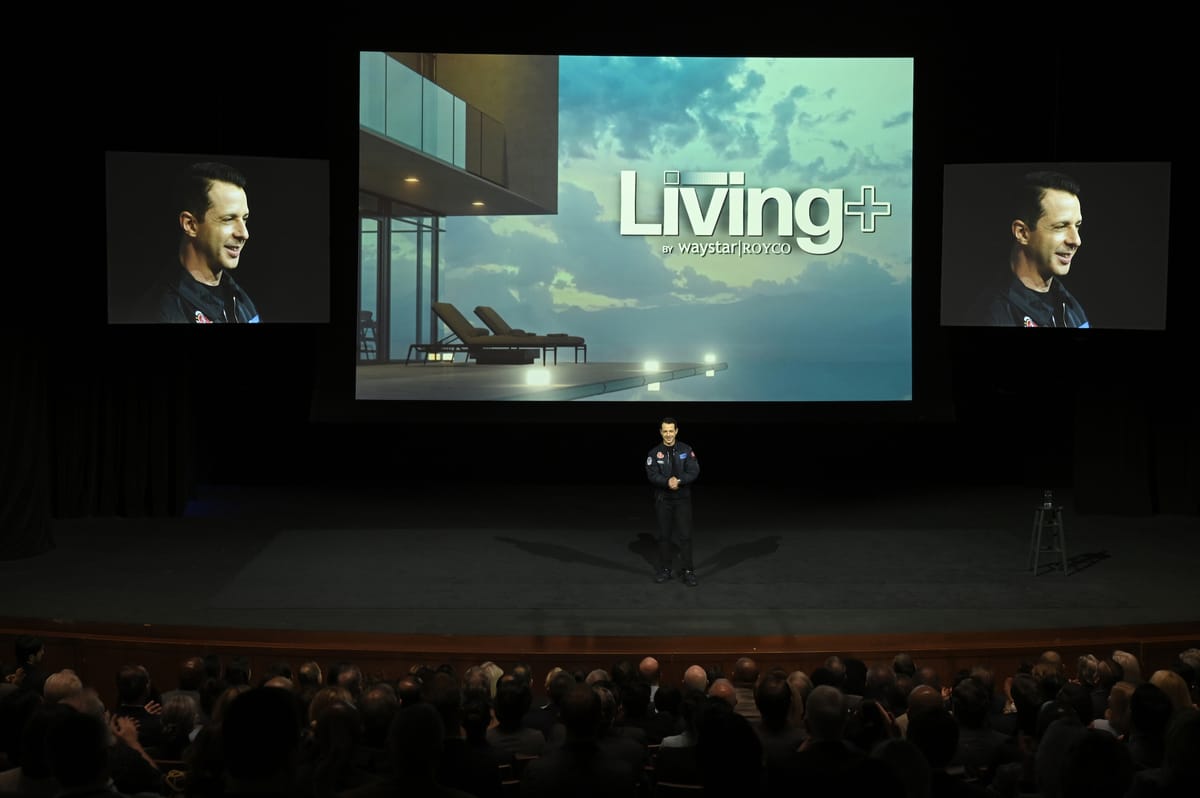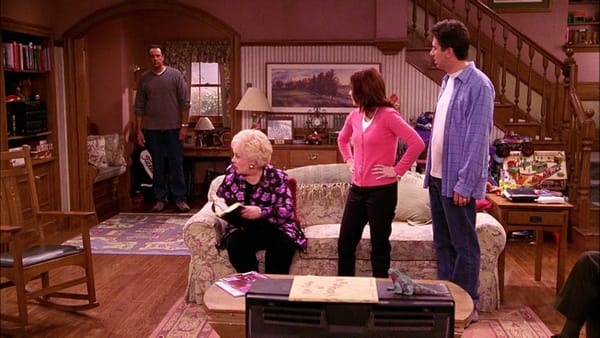This Succession episode from 2023 perfectly captures the first few weeks of 2025
We're all afraid of death, but nobody wants to talk about it.

For much of the four-season run of Succession, which famous family of awful rich people the fictional Roys most resembled was a recurring topic of conversation. Were they the Murdochs? The Redstones? If you dug around long enough, you could find interviews with creator Jesse Armstrong citing both as comparison points. Yet plenty of commentators stretched to make the Roys stand in for any number of other real rich families. And since we live when we live, that tendency was most frequently applied to the Trumps. (To make this idea work, you had to account for Connor being Tiffany, but honestly, that wasn't that much of a stretch.)
As much as I enjoyed these parlor games, I found that they filled roughly the same function as the endless discussions about which Game of Thrones characters corresponded with which American politicians. These discussions seem as though they are creating meaning – look how the things in real life are like the show! – but actually abstract both fiction and reality. If real life starts to feel like fiction, that obviously has weird knock-on effects. (Gestures to entire political reality rn.) But the more you try to turn fiction into real life, the more you can miss the ways its more general themes and ideas can speak to truths that are deeper than events.
In the case of Succession, then, discussions of how the wealthy family at the center of the series was like real wealthy families too often abstracted away the darker pain at the show's heart, namely its depiction of how familial abuse spirals outward from abused and abuser to wrap in everyone around them. And when you are talking about a family this rich and powerful, well, then "everyone around them" becomes quite a large circle affected by one family's whims.
I wrote the above piece just before the show's fourth and final season premiered. That final season took the show's themes and went one further by finally pulling death into the text of the show. In so doing, it increasingly seems as though the show became not just clear-eyed about its own moment but about where billionaires have dragged us as a country and as a planet since the show left the air.
Death was always an implicit part of Succession's world. The very first episode features the collapse of patriarch Logan Roy, and his recovery takes up much of said first season. The first season finale involves another death, this time of a man who dies because of seemingly levelheaded Kendall Roy's drugged callousness. This death is quickly swept under the rug, but it haunts every single episode that follows, becoming the thing that Kendall got away with but will never get away from. The show's own title speaks to which of Logan's four children will follow in his footsteps, which implies that Logan has to die at some point.
Then, in the third episode of season four, he does die. It's a masterful storytelling gambit that sends everything the show does swirling off into chaos. Suddenly, the united front the Roy siblings seemed to be presenting begins to fall apart. Suddenly, they turn on each other. Suddenly, a rogue tech billionaire proves the destabilizing element behind the scenes. Suddenly, an upcoming presidential election in which a fascist candidate might get elected becomes even more important.
What knits all of these ideas together isn't just Logan's death, however. It's that the Roy kids themselves have never seriously contemplated that they might die – even though we've seen Kendall seem to ponder ending his own life numerous times throughout the series, even coming very close to doing so in season three. If Kendall dies by suicide, that is ultimately an action he can convince himself he has agency over (even if his depression, trauma, and addiction are steering the car). But the idea that death might – no will – just randomly grab him one day, regardless of what he does... well, that's unfathomable.
All of which brings me to the fourth season's sixth episode, "Living+," which increasingly seems to me like one of the chief artistic statements on what it means to be alive in the 2020s. (You can read my contemporaneous recap of the episode here.)
Preorder my novel! Woodworking, my debut novel, is out for preorder right now. It follows Erica Skyberg, an English teacher and recently out trans woman in Mitchell, South Dakota, who decides to start asking the only other trans woman she knows for advice. Except that woman is Abigail Hawkes, one of her high school students, who would rather do anything else. And all the while, an election looms on the horizon...
Woodworking has starred reviews from Kirkus ("pristinely characterized") and Publishers Weekly ("a must-read"). Remarkably Bright Creatures author Shelby Van Pelt calls it "an ode to authenticity and a must-read in our current times." Nevada author Imogen Binnie says it's "one of the most heartfelt, funny, and moving portraits of transition I’ve ever come across."
It's out March 4, and yes an audiobook and an e-book will be out that day too! Preorder with the buttons below.
The backdrop for the episode is the Los Angeles-set Investor Day for Waystar Royco, the company the Roy family runs. Kendall and Roman – brothers and temporary co-CEOs of Waystar – have one goal: Drive up the company's share price so high that the tech billionaire gets cold feet and decides not to go ahead with purchasing Waystar. Unfortunately, the only new product they have to sell is a series of cookie-cutter homes, outfitted with lots of tech and full to bursting with Waystar content. The idea of these homes is to replicate the cruise ship experience on land, which sounds awful.
The episode's central story turn – perpetual loser Kendall seems like he's going to fuck up the presentation until he unexpectedly nails it and achieves his goal – is something I'm a little in awe of as a TV writer. But the Living+ houses themselves interest me even more. The episode is sprinkled with footage of Logan filming an introductory video for Living+. You can tell the old man is just sick of having to shill this crap, even though he knows he has to. When Kendall and Roman get their hands on this footage, however, it becomes like a weird beacon. At last, they can make things right with their dad after his death by saving his company via this utterly worthless product! Kendall goes so far as to manipulate this footage so it will seem like he's having a conversation with an enormous video projection of his father, then manipulates it even further so Logan says something he never actually did. It's a direct representation of how frequently we, in real time, edit our memories of a dead loved one to elide some of the messier details, the better to remember their idealized selves.
But death stalks the other Roys too. Roman spends his time in Los Angeles making incredibly rash and impulsive hiring and firing decisions – you must be alive if you're doing reckless shit! – and occasionally saying that he finds death uncomfortable to contemplate. Shiv, the sole Roy sister and the youngest child, checks out a conference room to be able to have a few minutes of pre-scheduled grief, something her estranged husband Tom finds out about. They reconnect as the episode goes on – but he still doesn't know that she's pregnant.
Everyone in this episode is looking for some way to escape death, but even Shiv – who is going to have a child and, thus, cheat death in a metaphorical sense – seems incapable of actually looking at what's coming for her. Even the central product the Roys shill is pitched as a way to avoid discomfort, to lock yourself away in a fortress-like home and avoid anything unpleasant until you... Well, they can't promise immortality, but they're working on it!
Yet this attempt to escape death is the exact opposite of living. It's a state of stagnation that ultimately makes one a closed-off version of themselves, incapable of embracing anything new and perpetually terrified of anyone who isn't immediately like themselves. The homes of Living+ are sold much the same way that Tesla has sold its Cybertruck: Here is a vehicle that will let you avoid anything in life that might at all make you feel an emotion other than dull, low-level pleasantness. Emotional highs and lows are closed off to you, and if you want to experience them, you'd better immerse yourself in something that will artificially boost them, be it drugs or gambling or endless speculative betting on various markets (or all of the above). Without other people around, you're theoretically safe from a sudden, shocking end to your life, except you never, ever are. Death is always right there, waiting, and there's nothing you can do about it.
As I wrote at Vulture at the time "Living+" aired:
And what are the homes of Living+ but safe and secure “paradises,” designed to shut out everyone who’s not rich enough to own one? At one point, a promotional slide offers the slogan “Minimize surprise; maximize satisfaction,” which is meant to sound reassuring but actually sounds ghoulish. Life is about more than sealing yourself off from anything uncomfortable, both externally and internally. It’s about more than making sure you’re never forced to be in the same room as a person you’ve just met. It’s about more than keeping yourself dull and desensitized to everything that’s happening, cocooned in your Kendall husk, covered in Waystar stickers.
The characters on Succession all live in hermetically sealed worlds, and they seem hollow, despairing, and lost. Their money has bought them security, but at what cost? When these characters connect, however briefly, it always feels a little too big and a little too bright, whether it’s the Roy siblings hugging in the wake of their father’s death or Tom and Shiv being slightly honest with each other after hooking up. Yet that connection is vulnerable, intimate, maybe even painful. So the shields go up; the husk returns. And because that is how they know how to see the world, they spread that vision outward via their media empire.
What makes this turn for Succession so wrenching is that "Gosh, I don't want to die" is something the endlessly wealthy Roys think that you may have thought at some point too. Being cognizant that death comes for us all and terrified of that fact is arguably the single most human emotion, the thing that sets us apart from the other animals. In the end, death doesn't care about your wealth or status. It only cares that you're alive.
Every day of this past week has brought the knowledge that our country is increasingly at the mercy of billionaires intent on scrubbing away anything that doesn't reflect themselves back at them. These guys are all in middle age, which is traditionally when you start to really realize that you will die. Much has been written about how many of them are doing their level best to completely avoid that – ask this guy about his son's blood – but the next best thing to that would be hollowing out the world so much that everybody was forced to behave exactly like you to survive. It is an attempt to grasp meaning by minds that are in a state of perpetual terror they disguise with the vague sense that they must be right.
But a planet, a country, a city, a home is not meant to be a place one merely survives. We're meant to live here together and understand that part of the bargain that is being alive is knowing that it ends. The thing about trying to live forever is that you can't. The other thing about trying to live forever is that in prolonging your life as much as you possibly can, you squeeze everything good out of it until all you have left is making everybody as miserable as you are.
But you're going to die. You just are. Probably not today, and probably not tomorrow. But someday. It's the one thing none of us can escape. I hope you figure that out and live accordingly.
(If you know Elon Musk, please send this newsletter to him.)
This week's reading music: "Denial Is a River" by Doechii
The free edition of Episodes, which (usually) covers classic TV and film, is published every other Wednesday, and the subscriber-supported edition of Episodes, which covers more recent stuff, is published every Friday. Paid subscribers also have access to the weekly Monday Rundown. This newsletter is written by Emily St. James and Libby Hill. If you have suggested topics, please reply to the email version of this newsletter or comment (if you are a paid subscriber).




